
Donniel Hartman
The Hartman Institute - a center of Jewish thinking and teaching
A Bostonian physician and his wife join their rabbi and several members of their Reform congregation for a two week seminar at the Hartman Institute in Jerusalem.
Our rabbi at Temple Emanuel in Newton, Massachusetts, Wesley R. Gardenswartz, is a big fan of the Shalom Hartman Institute in Jerusalem and regularly escorts temple members to the Institute's annual Community Leadership Summer Study Retreat. My wife, Sharon, was enthusiastic about going on the program but I was hesitant because my mode of thinking is largely secular and I was concerned that I would not easily relate to the teachings of a religiously-based institution, even one of my own religion. However, Rabbi Gardenswartz told me the teachers at the Hartman Institute were spectacular and unquestionably better than his teachers at Harvard College, Harvard Law School and the Jewish Theological Seminary. I eventually decided to go to the Hartman Institute partly because of his endorsement, but mainly because it was important to my wife.
The Shalom Hartman Institute describes itself as “a center of transformative thinking and teaching that addresses the major challenges facing the Jewish people." It claims to provide a "sophisticated, ideas-based Jewish education" and is committed to "the significance of Jewish ideas, the power of applied scholarship, and the conviction that great teaching contributes to the growth and continual revitalization of the Jewish people."
These broad and lofty phrases do not provide as specific a picture of the breadth and nature of the subject matter tackled by the Institute as would a short summary of selected talks. If I quibble with some of the Hartman teachings, that should not detract from the fact that overall the program was superb; also, an institute devoted to scholarly discussion should welcome various points of view. And that's what the Institute's President, Donniel Hartman, said: they welcome all Jews to join them but acknowledge that some Orthodox Jews might be unable to allow themselves the necessary flexibility.
The opening lecture was given by Donniel Hartman, a charismatic speaker who posed the provocative question: Do I have to believe in God in order to be a good Jew? Hartman posited that the notion of a good Jew is that of a good person. Though belief in God may be conducive to being a good person, it is not essential. You're a good Jew if you follow "universal moral standards." Hartman said the core of the Jewish tradition is being a good person and quotes Rabbi Hillel who famously said, "What's hateful to you do not do unto others." Being a good person is what counts; prayer, going to the synagogue and ritual are less important.
I was surprised and somewhat pleased that the initial tone of the program was so blatantly secular, with morality clearly trumping religious practice. We were told that in the United States only five percent of Jews regularly attend synagogue. Hartman’s position is understandable if his goal is to bring all Jews, including the many Jews who question or deny a belief in God, under the same tent. Hartman obviously understands that there is more to Judaism than being an ethical person, and doubts whether an atheistic Jew can be a “great Jew” but he avoided a precise definition of what he means by a good Jew or a great Jew. A Jew who is moral in a secular sense ranks as a good Jew; I suspect it takes a Jew who is both moral, believes in God and accepts the beliefs and rules of the religion to rank as a great Jew.
Rachel Korazim, who was born in Israel, is the daughter of Holocaust survivors and has worked with the Israel Defense Forces and Jewish communities outside Israel, gave a spectacular talk on "Faith after the Holocaust: a Perspective From Israeli Literature." She was such a good speaker that before the applause died down, Rabbi Gardenswartz was on line waiting to invite her to speak at our temple in America. She elected to discuss literature on what happened “here (in Israel), not what happened there”. Korazim said it was impossible to describe an indescribable world. With sweeping bodily gestures, she said there was no appropriate metaphor for the Holocaust; there is no metaphor for Auschwitz; there is no vocabulary for that experience. At school, she was the only one in her class who had a grandmother .When her grandmother died, at the shiva, instead of expressing grief, relatives and friends told her she should be thankful because "she could visit her grandmother in the hospital and she could visit her grandmother’s grave.” Someone told her, "I don't know where the ashes of my mother are".
Melila Hellner-Eshed, a professor of Jewish mysticism, spoke on "Practicing Faith". Her discussion of the poem, "The Thirst", written in 1910 by Hillel Zeitlin was impressive. In the poem various observers answer Zeitlin's question: “Have you seen my God? My God, where is He?"
A youth with golden curls answers, "He lies in honor amongst the deceased Gods, in the place of Baal, Jupiter, Brahma, great and small gods." "He died under the scientists' scalpel. The philosophers buried him. The poets eulogized him."
“Go forth … and you shall see graves upon graves. The grave of alchemy, the grave of astrology, … the grave of idealism … and the grave of all the metaphysical saints. Turn to the side and "you shall see a grave mound and under the mound your deceased God."
An old bald man says, "There is no God but for me. All is I. All is in me. I am the creator of Gods and their destroyer." A poet, says, "Why seek God outside yourself? For God is within you, in the rush of your blood." "In the most physical of realities and in the most subtle of spirits, in all you shall see your God; for He is-All." Another commentator responds, "Return to the God of your father, the God revealed at Sinai." A monk clothed in black says God is in the nearby synagogue. A "great mass of people say God is in the nearby mosque."
Zeitlin rejects all claims and hears a voice calling from "the depths of eternity".
"Seek me,” Zeitlin says. "I know no name for my God. I know not his definition or boundaries." Zeitlin’s search for God, "to seek what is missing”, is his religious experience. When asked what he seeks he says humans call it "wonder". When asked what path leads to it, he says, "I know not yet. Let me seek." For Zeitlin, the religious experience exists along the path of searching, Some of us, like Zeitlin, will seek answers that may not exist; others will confine their energies to the practicalities of life. My guess is that Zeitlin was still searching when he was murdered in a Nazi concentration camp in 1942.
You couldn’t help but like Micah Goodman. Too young to be so smart, his talks were punctuated by short bouts of infectious, pleasant laughter. Goodman is a scholar of Maimonides – with a published book to prove it,- and an interpreter of the Bible. He is also a teacher and directs a school at Ein Prat, at the edge of the Judean desert.
The title of his talk was "Monotheism and Power"; its underlying subject was how we approach the uncertainty of life. For Goodman, magic and idolatry are about power and control. If we do the rain dance it will rain; if it doesn’t rain, we didn’t do the dance properly. In monotheism, nature is secular and our ability to control it vanishes. We don’t have power, God is power and prayer is the alternative to idols and magic. We do not always get the answer we want but prayer is our acknowledgment that power rests with God, not ourselves. To the extent that prayer is also an attempt to control an uncertain world, I might argue with Goodman that the difference between magic, idolatry and prayer is not absolute.
In addition to lectures, we were treated to an excellent panel discussion that touched on various Israeli political and international issues such as the Iranian nuclear program and the relationship between the ultra-Orthodox, Haredim and the Jewish state. The panelists, Yossi Klein Halevi, Suzanne Stone and Gil Troy were smart, articulate and well-informed. We were also taken to an award-winning Israeli movie, The Matchmaker, that featured a man scarred by the Holocaust, and met with the movie’s talented director, Avi Nesher.
Our experience at the Hartman Institute took place in the beautiful city of Jerusalem. The Hartman campus, wrapped in Jerusalem stone, was spacious and a good environment for learning. I respond to light and, though it was a bit too hot, I took pleasure in noting that it was difficult to find any clouds in the Jerusalem sky. I returned to America intellectually nourished with a greater appreciation of the myriad aspects of Jewish life and scholarship.
Videos of Hartman lectures can be found at www.hartmaninstitute.com under Blogs

 Chanukah 5773
Chanukah 5773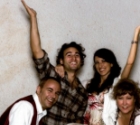 The Guild launches its season with The Fantasticks
The Guild launches its season with The Fantasticks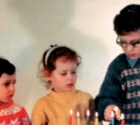 My Chanukiah
My Chanukiah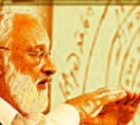 Kabbalah For All
Kabbalah For All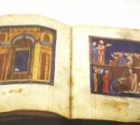 Haggadot
Haggadot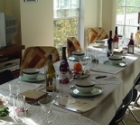 Passover 5767 ...The Holiday of Freedom
Passover 5767 ...The Holiday of Freedom David Steinberg
David Steinberg